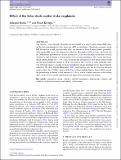Files in this item
Effect of the Solar dark matter wake on planets
Item metadata
| dc.contributor.author | Banik, Indranil | |
| dc.contributor.author | Kroupa, Pavel | |
| dc.date.accessioned | 2021-10-13T14:30:12Z | |
| dc.date.available | 2021-10-13T14:30:12Z | |
| dc.date.issued | 2019-08 | |
| dc.identifier | 276206349 | |
| dc.identifier | 857966b9-8250-4e41-85d8-b841b73b969b | |
| dc.identifier | 85070071849 | |
| dc.identifier.citation | Banik , I & Kroupa , P 2019 , ' Effect of the Solar dark matter wake on planets ' , Monthly Notices of the Royal Astronomical Society , vol. 487 , no. 4 , pp. 4565-4570 . https://doi.org/10.1093/mnras/stz1601 | en |
| dc.identifier.issn | 0035-8711 | |
| dc.identifier.other | ORCID: /0000-0002-4123-7325/work/101218064 | |
| dc.identifier.uri | https://hdl.handle.net/10023/24133 | |
| dc.description | Funding Information: IB is supported by an Alexander von Humboldt postdoctoral fellowship. | en |
| dc.description.abstract | The Galaxy is conventionally thought to be surrounded by a massive dark matter (DM) halo. As the Sun goes through this halo, it excites a DM wake behind it. This local asymmetry in the DM distribution would gravitationally affect the motions of Solar System planets, potentially allowing the DM wake to be detected or ruled out. Hernandez (2019) recently calculated that the DM-induced perturbation to Saturn's position is 252 m net of the effect on the Sun. No such anomaly is seen in Saturn's motion despite very accurate tracking of the Cassini spacecraft, which orbited Saturn for >13 yr. Here, we revisit the calculation of how much Saturn would deviate from Keplerian motion if we fix its position and velocity at some particular time. The DM wake induces a nearly resonant perturbation whose amplitude grows almost linearly with time. We show that the Hernandez (2019) result applies only for an observing duration comparable to the ≈250 Myr period of the Sun's orbit around the Galaxy. Over a 100 yr period, the perturbation to Saturn's orbit amounts to <1 cm, which is quite consistent with existing observations. Even smaller perturbations are expected for the terrestrial planets. | |
| dc.format.extent | 6 | |
| dc.format.extent | 318977 | |
| dc.language.iso | eng | |
| dc.relation.ispartof | Monthly Notices of the Royal Astronomical Society | en |
| dc.subject | Celestial mechanics | en |
| dc.subject | Dark matter | en |
| dc.subject | Ephemerides | en |
| dc.subject | Gravitation | en |
| dc.subject | Planets and satellites: Dynamical evolution and stability | en |
| dc.subject | Space vehicles | en |
| dc.subject | QB Astronomy | en |
| dc.subject | QC Physics | en |
| dc.subject | Space and Planetary Science | en |
| dc.subject | Astronomy and Astrophysics | en |
| dc.subject | 3rd-DAS | en |
| dc.subject.lcc | QB | en |
| dc.subject.lcc | QC | en |
| dc.title | Effect of the Solar dark matter wake on planets | en |
| dc.type | Journal article | en |
| dc.contributor.institution | University of St Andrews. School of Physics and Astronomy | en |
| dc.identifier.doi | 10.1093/mnras/stz1601 | |
| dc.description.status | Peer reviewed | en |
| dc.identifier.url | https://arxiv.org/abs/1907.07130 | en |
This item appears in the following Collection(s)
Items in the St Andrews Research Repository are protected by copyright, with all rights reserved, unless otherwise indicated.

